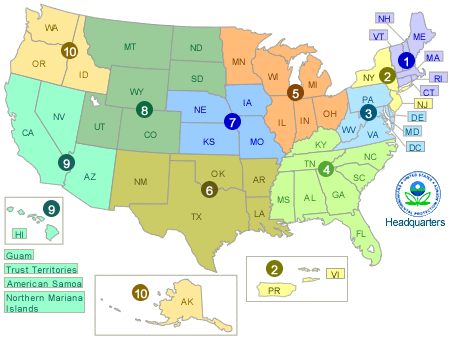Regional Collaboratives & EPA Regions
On this page:
Regional Collaboratives

Clean Air Northeast - EPA Regions 1 & 2
The Clean Air Northeast is a regionally coordinated initiative to reduce diesel emissions, improve public health, and promote clean diesel technology. The Collaborative brings together the collective resources and expertise of several state environmental agencies, EPA regional offices, and private sector companies to address the existing fleet of diesel-powered vehicles and equipment.
Through innovative projects, voluntary measures, and mandatory programs, the Collaborative and its partners target municipal, transit, ports/authorities, construction and freight sectors contributing to diesel emissions in the Northeast, Puerto Rico, and the US Virgin Islands.

Mid-Atlantic Diesel Collaborative - EPA Region 3
The Mid-Atlantic Diesel Collaborative is a partnership between leaders from federal, state, and local governments, the private sector, and environmental groups in Delaware, Maryland, Virginia, Pennsylvania, West Virginia and the District of Columbia working to reduce diesel emissions.

Southeastern Team Reducing the Impacts of Diesel Emissions - EPA Region 4
The Southeastern Team Reducing the Impacts of Diesel Emissions Collaborative includes leaders from industry, academia, non-government organizations, interested citizens and government at all levels, working to improve air quality and public health by encouraging the use of clean, renewable energy, and by reducing diesel emissions from existing engines and equipment.
The STRIDE Collaborative achieves its goals by employing the following strategies:
- Encouraging alternative fuel use, conserving fuel, promoting energy independence;
- Installing clean retrofit devices on diesel equipment;
- Encouraging older engine replacement and repowering; and
- Analyzing and disseminating best practices to reduce engine idling and properly maintaining equipment.

Midwest Clean Diesel Initiative - EPA Region 5
The Midwest Clean Diesel Initiative is a collaboration of federal, state, and local agencies, along with communities, non-profit organizations, and private companies, all working to reduce exposure to diesel emissions. MCDI addresses emissions from diesel engines and equipment owned and operated in Illinois, Indiana, Michigan, Minnesota, Ohio, and Wisconsin.
Some of MCDI's strategies include:
- Replacement of old engines and equipment with newer and cleaner EPA-certified versions;
- Implementation of efficiency-improving operational techniques for fleets and centers of high diesel engine activity (rail yards, warehouses, intermodal terminals, fleet garages, etc.);
- Educating partners and the public about the dangers of exposure to diesel emissions and the actions that can be taken to reduce exposure to diesel emissions; and
- More can be found here.

West Coast Collaborative - EPA Regions 9 & 10
The West Coast Collaborative is an ambitious public-private partnership between leaders from federal, state, and local government, the private sector, academia, and environmental groups committed to reducing diesel emissions and advancing clean air technologies and practices along the West Coast of North America. The Collaborative aims to reduce diesel emissions through verified and certified technologies, engines and practices, and advances innovative emission reduction technologies and practices.
The Collaborative is focused on creating, supporting and implementing diesel emissions reductions projects. To accomplish this goal, the Collaborative:
- Raises awareness of the need for diesel emissions reductions and the many highly successful state, tribal, local, and regional efforts that promote and support voluntary projects;
- Creates a forum for information sharing among diesel emissions reductions advocates, and works to leverage significant new resources to expand voluntary diesel emissions mitigation efforts; and
- Implements projects that are regional in scope, leverages funds from a variety of sources, achieves measurable emissions reductions, and create momentum for future diesel emissions mitigation efforts.
EPA Regions

